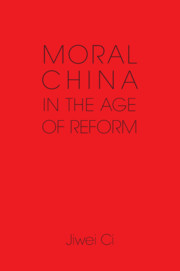Book contents
- Frontmatter
- Dedication
- Contents
- Acknowledgments
- Introduction
- 1 An Anatomy of the Moral Crisis
- 2 Political Order, Moral Disorder
- 3 Freedom as a Chinese Question
- 4 Freedom and Its Epistemological Conditions
- 5 Freedom and Identification
- 6 Neither Devotion Nor Introjection
- 7 The Insult of Poverty
- 8 Democracy as Unmistakable Reality and Uncertain Prospect
- 9 Freedom’s Unfinished Task
- 10 China’s Space of Moral Possibilities
- Index
Introduction
Why the Question of Freedom Is Unavoidable
Published online by Cambridge University Press: 05 September 2014
- Frontmatter
- Dedication
- Contents
- Acknowledgments
- Introduction
- 1 An Anatomy of the Moral Crisis
- 2 Political Order, Moral Disorder
- 3 Freedom as a Chinese Question
- 4 Freedom and Its Epistemological Conditions
- 5 Freedom and Identification
- 6 Neither Devotion Nor Introjection
- 7 The Insult of Poverty
- 8 Democracy as Unmistakable Reality and Uncertain Prospect
- 9 Freedom’s Unfinished Task
- 10 China’s Space of Moral Possibilities
- Index
Summary
A little more than three decades ago, China embarked upon a course of fundamental change in its economy and society, and we now have a tangible record, positive and negative, of what has transpired on these fronts. The trajectory of subjectivity – of moral life and life of the spirit – belongs to a rather different part of the larger story: more than thirty years after the winds of change started sweeping across the moral and spiritual landscape of China, the dust is still swirling around, and what has taken temporary shape is a veritable morass. All members of Chinese society, including myself, are part of this dust, this morass, and our understanding of our own situation is, for the most part, no less unsettled and confused.
One sign of this confusion is the way in which the question of political reform is typically approached and lack of progress and its consequences comprehended. It is a commonplace of both Chinese and Western analyses of the matter that political reform has lagged far behind economic reform and that political reform must catch up soon if China is to maintain its momentum of economic growth and prevent problems such as official corruption and social injustice from going completely out of control. While it contains a grain of truth, this piece of received wisdom only scratches the surface. Political reform is a value-laden process, and, as such, it can achieve a real breakthrough only if a corresponding breakthrough in values – even perhaps a revolution in values – takes place in Chinese society at the same time. What is the infrastructure of values that must exist if political reform is to make moral sense and command more than opportunistic support? What is it about the structure of Chinese society and its political system that stands in the way, not so much of political reform, as of the more fundamental transformation in values? Deeper if more elusive questions such as these must be addressed if we are to understand the tortured process of political reform and what is necessary for its prospects to improve. But these questions are also worth pursuing in their own right – as questions about the state of morality, subjectivity, and life of the spirit in China today. Indeed, they must be pursued in their own right if we look for answers of adequate depth and scope.
- Type
- Chapter
- Information
- Moral China in the Age of Reform , pp. 1 - 11Publisher: Cambridge University PressPrint publication year: 2014



